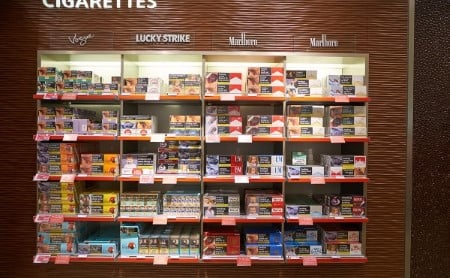More States Consider Restricting Sale of Flavored Tobacco Products
February 16, 2021 | Maggie Davis
 A pressing public health issue before the COVID-19 pandemic hit, the need for public health interventions to reduce tobacco use is heightened with a strong association between tobacco use, in all forms, with severe COVID-19 outcomes. Additionally, tobacco use remains the leading cause of preventable death in the U.S., claiming approximately 480,000 deaths each year. Evidence-based policies to reduce tobacco use like raising the age of sale to 21, increasing tobacco pricing, and prohibiting the sale of flavored tobacco products are common public health strategies enacted through state legislation. As anticipated in ASTHO’s Legislative Prospectus on E-Cigarettes, states are considering many of these evidenced-based tobacco reduction strategies during the 2021 legislative sessions.
A pressing public health issue before the COVID-19 pandemic hit, the need for public health interventions to reduce tobacco use is heightened with a strong association between tobacco use, in all forms, with severe COVID-19 outcomes. Additionally, tobacco use remains the leading cause of preventable death in the U.S., claiming approximately 480,000 deaths each year. Evidence-based policies to reduce tobacco use like raising the age of sale to 21, increasing tobacco pricing, and prohibiting the sale of flavored tobacco products are common public health strategies enacted through state legislation. As anticipated in ASTHO’s Legislative Prospectus on E-Cigarettes, states are considering many of these evidenced-based tobacco reduction strategies during the 2021 legislative sessions.
Age of Sale
The federal government raised the age of sale of tobacco products from 18 to 21 in 2019, nationalizing a policy that 19 states, D.C., Guam, and Palau already enacted. Although the federal government has raised the age of sale nationally, a number of states raised the state age of sale legislatively to reduce confusion between state and federal law—and to bring state and federal enforcement efforts into compliance with one another. In 2020, 14 more states raised the age of sale for tobacco products to 21, bringing the total to 33 states and three territories requiring tobacco purchasers to be 21 or older.
As anticipated, more states are considering state legislation to raise the state age of sale for tobacco products to 21. As of Feb. 8, ASTHO identified nine more states—Alabama, Alaska, Florida, Kansas, Nevada, North Dakota, Mississippi, Missouri, and South Carolina—considering legislation to raise the age of sale of tobacco to 21. States that previously raised the age of sale to 21 are now considering legislation to better enforce the change. For example, Oregon is considering a bill that would expressly permit public health and liquor control entities to investigate possible violations of the tobacco 21 law by using individuals between 18 and 20 years old to conduct controlled purchases. Other states, such as Indiana and Oklahoma, are considering legislation requiring tobacco retailers to verify a customer’s age using scanning technology or automated software systems. Beyond traditional scanning technology to verify government issued identification, a New York bill would allow age verification using biometric information like fingerprints or facial image. The New York proposal would require the biometric information be authenticated against a verified commercially available database.
Flavor Restrictions
The Population Assessment of Tobacco and Health (PATH) Study conducted by FDA and NIH identify flavored tobacco products as a potential motivation for youth and young adults to begin using tobacco. This association lead two states—California and Massachusetts—to end the sale of all flavored tobacco products and three states to end the sale of flavored e-cigarettes. So far at least eight states—Connecticut, Hawaii, Indiana, Maryland, New Mexico, New York, Vermont, and Texas—have introduced legislation that would ban all flavored tobacco products, including menthol products, that have long played a role in exacerbating health disparities tied to tobacco use. As part of its legislation proposing a ban on flavored tobacco products, states like Vermont include legislative findings that flavored tobacco products are associated with youth tobacco use.
In addition to general prohibitions of flavored tobacco, some jurisdictions are prohibiting the sale of specific flavored tobacco products. For example, the District of Columbia is considering a ban on all flavored electronic smoking devices. States with limited flavor bans are considering banning other forms of flavored tobaccos. For example, New York—which banned flavored e-cigarettes in 2020—is considering a bill that would prohibit the sale of flavored smokeless tobacco within 500 feet of a school.
Pricing Increases
States are able to dissuade tobacco use by imposing pricing increases on tobacco products through consumption taxes. Tobacco taxes also provide an opportunity to raise public revenues at a time when the economic downturn tied to COVID-19 is straining state budgets. At least 24 states are considering changes to their tobacco tax rate in the 2021 legislative session. Alaska, Connecticut, Hawaii, Kentucky, New York, Oklahoma, Tennessee, Texas, and Washington are all considering bills that would increase the tax on electronic or vapor tobacco products. In addition to increasing prices on e-cigarettes, some states are considering levying taxes on related materials. For example, Arkansas is considering a bill that would levy a tax on cigarette paper.
Beyond tax increases, at least one state, New York, is considering legislation that would prevent manufacturers from offering coupons for tobacco products. The New York proposal would prohibit the sale of any tobacco product for less than the listed price and explicitly prohibits retailers from honoring coupons for tobacco products.
Point of Sale
A number of states are also considering bills that would add additional requirements at the point of sale to make e-cigarettes and other tobacco products less accessible to underage consumers. For example, a North Dakota bill would require all consumer tobacco purchases be conducted face-to-face, prohibiting direct to consumer shipping. The state of Washington is considering a bill that would prohibit tobacco retailers from selling more than 16 e-cartridges to a patron per month.
ASTHO will continue to track legislative activity related to this important public health issue.